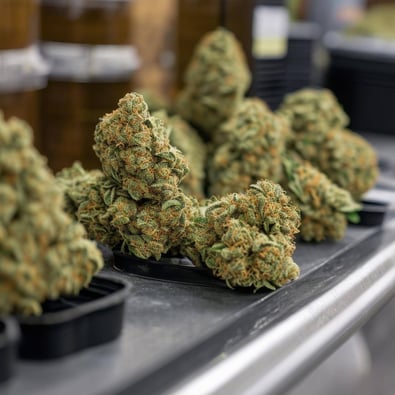Missouri Cannabis Tester Faces Legal Threats Over Mold Test Results in Marijuana.
A St. Charles County microbiologist’s test results for mold in marijuana, which he has shared on social media, are drawing questions from cannabis consumers and legal threats from members of the state’s cannabis industry.
Kirk Hartwein, owner of Missouri Mold LLC of O’Fallon, has posted dozens of close-up photos of petri dishes, many covered in mold colonies, to his Facebook page this year.
The colonies represent mold spores present in one gram of cannabis flower purchased from licensed Missouri dispensaries, Hartwein said.
“I test consumer products,” he said. “I think there’s certain medicinal patients who are underserved by not having a full amount of information about what they’re buying.”
But while a growing audience is taking stock of Hartwein’s findings, critics have questioned his results. Three legal cultivators featured on his page have sent Hartwein cease-and-desist letters in recent months.
Hartwein is standing by his tests.
Hartwein, who earned a biology degree in 1993 from Missouri State University, started his Missouri Mold business in December, according to state records. He publicizes marijuana testing services on his website.
His Facebook page highlights the state-by-state approach to regulating mold in marijuana that has taken place in the absence of federal legalization, which would allow for federal rules on mold and more research.
Hartwein noted Missouri mold testing requirements don’t include limits for total mold and yeast counts like in other states such as Illinois.
Missouri requires its testing labs to screen for four types of Aspergillus mold known to cause illness in humans. The state also requires testing for certain mycotoxins produced by mold.
Tests in Missouri also fail if they show more than 2% of foreign matter such as powdery mildew, mold, mites, hair and dirt.
But there is no total yeast and mold limit, which in Illinois is set at 1,000 colony-forming units per gram.
James MacRae, a cannabis industry analyst and founder of Seattle-based Straight Line Analytics, said his ideal regulatory scheme would include random testing at the retail level, with “some teeth to it.”
“Keep the consumer safety at the forefront for no other reason because cannabis is the least harmful recreational drug out there with respect to a harm-reduction perspective,” MacRae said.
While Missouri products must undergo testing before being distributed to dispensaries, MacRae said Hartwein, buying directly from dispensaries, is “testing much more like what the consumer would see.”
But Dr. Andrej Spec, an associate professor of medicine at Washington University who has researched fungal infections in immunocompromised patients, called Hartwein’s posts unhelpful.
This is “not a study,” he said. “None of this is scientific or connected to patient outcomes. So, this does not help.”
Hartwein pushed back on Spec.
“He can do his own work if he wants to,” Hartwein said.
Hartwein said there were consistent patterns “from brand to brand,” he said. “Some are routinely bad, and some are routinely good, from my quality perspective.”
One of the brands mentioned on Hartwein’s page in June, St. Louis-based CAMP Cannabis, recently came under state investigation, apparently triggered by a whistleblower who accused the company of selling moldy weed.
Even though Spec was critical of Hartwein’s tests, he said he advises his patients not to smoke marijuana.
He said for patients wishing to consume marijuana, edibles are a safer route.
“Fire is just not good for our lungs. And infections do happen,” Spec said. “I actually actively advise my patients not to ... use marijuana in the smoking form — really for anybody, but especially for the immunosuppressed.”
Christina Thompson, a founding member of the group ShowMe Canna Freedom, said Hartwein’s results weren’t surprising.
“The cannabis community is, you know, very picky about where we get our cannabis,” Thompson said, adding there have been a lot of “concerns from our community about having moldy weed.”
Thompson said it didn’t seem that Hartwein was “doing this maliciously.”
“I think that it highlights a pretty specific concern that all the people in our community have about safe cannabis and safe consumption,” she said.
“His results at the very least warrant a second look,” Thompson said. “Those results didn’t just come from nowhere. And either they came from bad science or they came from (expletive) weed.”




